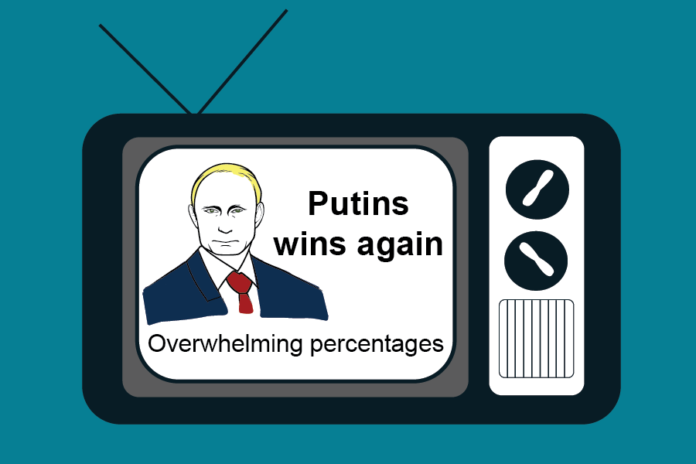Where voter apathy is the strongest candidate
On March 18, 2018, Vladimir Putin –– Russia’s longest-serving ruler since Joseph Stalin –– won his fourth term as president in a landslide victory. A record 56.2 million Russians cast their ballots, giving Putin more than 76% of the vote.
Although his victory came as no surprise, following his other wins in the past 18 years, the validity of voter turnout remains questionable. Russia is a democracy and appearances do matter, especially with western accusations of autocracy. High levels of support for Putin, therefore, are still necessary to convince Russian citizens, and perhaps even the Kremlin, that his win is well deserved.
Following the election, thousands of volunteer electoral observers revealed that only 55% of the voting population voted for Putin — a 21% decrease since the last election. Opposition leader Alexei Navalny accused government authorities of rigging votes to avoid an embarrassingly low turnout.
Surveillance footage from polling stations even caught numerous instances of ballot-stuffing by electoral workers, totaling over 2,000 complaints of violations for the independent electoral monitor Golos.
When observers sent by Navalny were present in polling stations in Chechnya, a region that generally reports 99% participation, the turnout was markedly reduced. Physicist Sergei Shpilkin suggested that nearly 10 million votes were falsified for Putin. This would not be the first time, as Shpilkin noted similar patterns during Putin’s first reelection in 2004 and again in 2012.
Though eliminating those votes would not prevent Putin’s victory, they do paint an inaccurate picture of voter morale in Russia. This intervention gives the illusion that the majority of Russians actually want to re-elect Putin –– that every electoral outcome is made democratically. Worse, it shows that any other votes or candidates are futile.
“The problem wasn’t the falsifications, the problem was how the campaign was conducted,” said Grigory Melkonyants, the head of Golos. “When voters are forced to go to the polling station, when they don’t have information about the candidates, the media endlessly talk about one but don’t mention others or speak negatively of them, when free media doesn’t give information, so voters could form a different position, that’s a problem.”
Navalny, Putin’s most vocal and popular rival, announced his candidacy back in December of 2016. His campaign focused on domestic issues, like improving the economy and combating corruption. In the past, he was jailed several times for organizing anti-Putin marches and was nearly blinded after a pro-Kremlin activist threw chemicals at his face.
Though Navalny seemed like the only candidate with a real chance of challenging Putin, his campaign was cut short after he was charged with embezzlement –– disqualifying him from the race.
Navalny insisted that the charge was politically motivated and considered it a sign that the Kremlin found him too dangerous to take part in the election. It is not surprising that this was not the first incident. In 2013, Navalny also faced an embezzlement charge. The European Court of Human Rights, however, ruled that the fraud conviction imposed against Navalny was “arbitrary and manifestly unreasonable.”
Even with Putin’s predetermined victory each election, it’s interesting that the Kremlin still attempts to vilify those who oppose him. This leaves Russians with either no choice or abstention, which the government then masks with fake ballots. Instead of voters asking themselves, “Who should I vote for?” the question becomes, “Why bother?”
“Anything the Russians did concerning the 2016 Election was done while Obama was president. He was told about it and did nothing! Most importantly, the vote was not affected,” President Donald Trump recently tweeted.
Assurance that “the vote was not affected,” sounds similar to Russia’s 2018 election. Disqualifying Navalny and reporting higher votes may not have changed the outcome, but declaring Putin president in the name of the Russian citizens is as misleading as it is dangerous. And with plans to extend Putin’s rule until 2036, Russian citizens’ vote won’t count for a long time.
Written by: Julietta Bisharyan — jsbisharyan@ucdavis.edu
Disclaimer: The views and opinions expressed by individual columnists belong to the columnists alone and do not necessarily indicate the views and opinions held by The California Aggie





